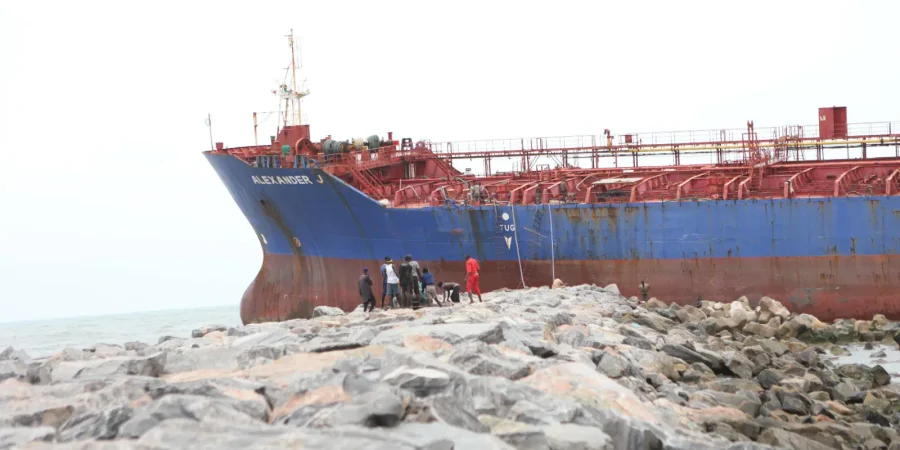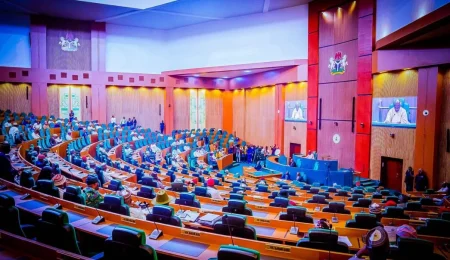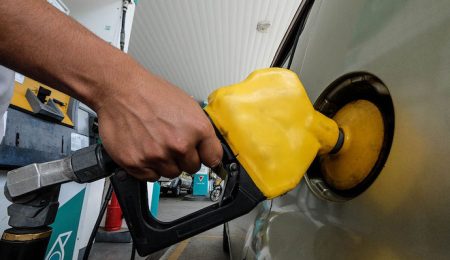Nigeria is losing huge revenues from the operations of businesses along the Excravos water channel due to heavy build-up of silt on the waterway, hindering smooth passage of vessels, THISDAY learnt on Monday.
The problem has been further compounded as a result of the slow paperwork for the ‘desilting’ of the channel by the Nigerian Ports Authority (NPA), the federal government agency that manages the operations around the affected area in the Warri axis of Delta state.
Sources told THISDAY that several vessels had been running aground in the channel, further compounding the mess because the NPA, which should ensure the orderly movement of vessels around the area, has largely shirked its responsibility.
The Escravos channel, an important water route for vessels, flows about 57 kilometres, ending off the Gulf of Guinea where it flows into the Atlantic Ocean.
“Typically, this is the channel that allows access into the Warri port and there are multiple users. It is also a channel that provides access for the tankers that bring in Premium Motor Spirit (PMS) for the country.
“NNPC is a key user because those are tankers that are commissioned by them. Now, with regards to crude oil production for the country, some of the assets in the western Niger Delta corridor also convey crude oil from the fields via mid-range tankers shuttling from the asset through the channel to offshore location for export.
“Now, this channel, over the years as is typical with nature has been silted. So, increasingly, it has been difficult for vessels to navigate and once aground will require assistance to refloat with high-powered tug boats, ” one of the tug boat providers said.
THISDAY checks showed that in the past, several ocean-going vessels owned by Matrix Energy and other ship owners/charterers including MV Adebomi 3, MT Matrix Triumph, MT Matrix Asa, and MV Zola had run aground within the same axis.
It was further learnt that since the maximum draft at the channel during high tide is about 6.2 meters, many vessels now routinely get stuck in the area, leading to loss of huge revenues, including expenditure on heavy machinery for towing the affected vessels.
Before they are towed, these vessels are said to block the entire channel, thereby making it impossible for other vessels to move along the route for sometimes as many as 10 days, leading to significant financial losses.
Aside from the oil companies, including Chevron and Shell, which use the route, it was further understood that other local small scale endeavours also use the line to move bulk products.
To ensure sanity on the water route pending dredging, THISDAY learnt that the users have clamoured for NPA to maintain stricter oversight on the issue of draft restrictions in order to avoid the occurrence of blockage of the channel by overloaded vessels.
“You would expect that the responsible agency would ensure that it remains navigable because of its importance because these operators are providing a service, and they are supporting the country’ cash flow plans and revenue generation, whether through the production making its way to the terminals.
“But businesses are experiencing frustration and there’s a heightened sense of emergency to do something, anything at all, on that channel. There’s an agency there that governs or marshal out user rules and regulations.
“But you can imagine that people also play ‘try your luck’. They will load up their vessels, pass the acceptable rate for the draft, and will just try to see if they can find their way through. On the average, you could see vessels that are grounded for seven days or over 10 days.
“And what it means is that as soon as you have that, there are businesses that are suffering. There’s zero activity for the next seven days, and the ramifications or consequences is the inability to deliver service timely,” one user told THISDAY.
Another channel user added: “Every channel has a limit of six, seven, eight metres and there’s always a control tower that tells the vessels to come in at the right time, depending on their draft then.
“But what is happening now is that because that place is silted, and the chiefs in Abuja and Lagos are not making the right decisions, the harbour master in Warri and his team still give vessels green lights, even when he knows that their drafts are not accommodated by the channel.”
The user pointed out that once they get in there, they will run aground, then a tugboat will be sought to pull it out. About three days ago, he stated that there were three blockages, which had taken an average of eight to nine days to open up. It seems this is another business for tugboat vendors which the operators are wondering what the motive is.
“So, you can understand that business activity in that axis has crumbled. And this is where you have oil production and other activities. This is the channel. There are two channels in Warri. One is the Escravos channel. One is the Forcados channel. They’ve allowed the Forcados channel to silt a long time ago. So, that one is abandoned.
“Now, this one, if they allow it to go this way, it means that it will get to a point where they will even abandon any marine economic activity in the Warri axis as well,” the source added.
According to the source, it is expected that parties move to urgently resolve the business challenge that is currently impacting business activities in the Niger Delta.
“We all are aware these could be another issue that leads to not improving the commercial and business activity in the Niger Delta.
“It seems the issue today is because as usual in Nigeria, everybody wants his interest to be covered, reason it’s taking NPA time to close the dredging mobilisation for such a critical national interest (what could be termed a water gateway) to deteriorate.
“NPA, if needed should explore initiative to fast track, including seeking the support of the users who ordinarily pay for the use of the channels. This is like a toll highway, as such funding shouldn’t be an issue.
“Clearly, the impact of this on the PMS distribution in the country is obviously from the long queues. The impact on production shut-in is almost a billion dollar in this time of below par production and shortage of Foreign Exchange for the country ,not to mention the added cost to the business due to long waiting of vessels at the channel ,” THISDAY was told.
In May this year, about seven daughter vessels carrying a combined total of 150 million litres of petrol were reported to have been trapped on the high sea at the Escravos channel, leading to a worsening of the fuel supply crises.
Emmanuel Addeh
Follow us on:



